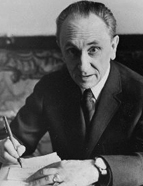

Underlying his early historical works, in line with traditionalist thinking, was a general idea of revising values that he considered necessary to replace those that the 19 th century, ‘false, illusory, perfectly unfit to guide and lead us’, had bequeathed. Following the line of integralist positivism, which sees History as a source of experience, historical values, in his view, would be the most suitable for the task of ‘enlightening and guiding the men of this time’ ( Porque e screvi a ‘História de Portugal’ [ W hy I wrote the ‘History of Portugal’] 1941, pp. 7; 9): values passed on by the example of figures and events that he considered to be ‘dynamic’ and not ‘static’ ( Rumo da Juventude [The direction of Youth] , 1942, p. 84). This is why, for example, he wrote, with Rodrigues Cavalheiro, in Erratas à História de Portugal, that the best way to serve the country would be to ‘love and defend it in the integrity of its History [ … ]’ and ‘help the public to clearly discern the truth, which for so long has been hidden from them by the ill- faith or denationalisation of so many false historians’ ( Erratas à História de Portugal , [Errata to the History of Portugal] 1939, no page number). This position helps us to understand why João Ameal supports, for example, the censorship of the press and historiographical control carried out in Fascist Italy, which he briefly looked at in the 1930s, emphasising ‘the particular interest with which historical texts are monitored, so that certain unscrupulous men cannot be allowed to indulge in disfiguring and slandering the great figures and the great journeys of national tradition’ ( A Revolução da Ordem [The Revolution of Order], 1932, pp. 70-73).
It is also noticeable, especially in the texts he wrote for Nação Portuguesa [Portuguese Nation] and for the journal Integralismo Lusitano – Estudos Portugueses [Lusitanian Integralism- Portuguese Studies] , that he had a certain teleological perspective on H istory – a bit like other intellectuals linked to the IL: indeed, for Ameal, one of the functions of national historiographical work would be to reintegrate ‘Portuguese man [ … ] into the legitimate concept of his universal value [ … ], seen in the fullness of his mission throughout the ages – a link in the chain that the trajectory of the homeland has been form ing since the 12 th century’ ( No Limiar da Idade-Nova [On the Threshold of the New Age] , 1934, p. 13).
This work is financed by national funds through FCT - Foundation for Science and Technology, I.P, in the scope of the projects UIDB/04311/2020 and UIDP/04311/2020.
